
This guest blog post was written by the students of Swarthmore Mountain Justice and cross-posted from swatmj.org.
Early this morning, Swarthmore Mountain Justice launched an extended sit-in for fossil fuel divestment on the campus that birthed the now global divestment campaign, kicking off a historic spring of escalating nonviolent action throughout the student divestment movement. The 37 students and 6 alumni are asking the Swarthmore Board Investment Committee Chair Chris Niemczewski and Board Chair Gil Kemp to return to the negotiating table and agree to end the College’s investments in a rogue industry that violates Swarthmore’s Quaker values and recklessly imperils a just and sustainable future for our generation.
Our goal is to engage Mr. Kemp and Mr. Niemczewski in a productive dialogue on how to move forward on fossil fuel divestment. But to ensure that this dialogue is productive, Mr. Kemp and Mr. Niemczewski must reckon with the increasingly deadly impacts of the climate crisis on our world’s most marginalized communities, as well as the possibility of an uninhabitable future for our generation. Our action today reflects the urgency of this crisis.
Our campaign is one of many campaigns that will be taking nonviolent direct action for divestment this spring. This marks a turning point in the fossil fuel divestment movement, as students are, for the first time ever, taking escalated action on their own campuses and targeting the decision-makers at their own schools. Our movement calls on institutions to divest from the 200 coal, oil, and gas companies most responsible for the climate crisis, and reinvest in community-led solutions at the frontlines of poverty and pollution.More than any other climate campaign before it, the fossil fuel divestment movement has eroded the power of the fossil fuel industry and shifted the conversation on climate. The fossil fuel industry’s recent attacks on the divestment movement are a testament to its success.
We are calling on our college – the very institution tasked with preparing us for the future – to stand with us in ensuring a just and stable future. The Swarthmore community recognizes this opportunity to align our investments with our values. Over 1,100 faculty and alumni, along with 970 students (61% of the student body), have signed a petition calling on the College’s Board of Managers to divest from fossil fuels. Despite this, the Board has rejected this historic opportunity to show international leadership on climate. We cannot stand idly by as Mr. Niemczewski and Board Chair Gil Kemp continue to prevent the Board of Managers from responding to the mandate from the Swarthmore community to align our investments with our values.
Climate change is already an unprecedented crisis that affects us all, but we know that it will be low-income communities and communities of color that will endure the worst of our inaction. When we extract and burn fossil fuels, low-income communities and communities of color around the world are the first to be burdened with poison and pollution, and when the tides rise and the storm comes, those same communities are the last to be evacuated and rebuilt. Humanity is running out of time for the world to change course and prevent catastrophic climate change. According to UN’s latest climate report, if we are to have a chance of avoiding ‘runaway’ global warming of over 2 degrees Celsius, global emissions must peak within 5 years. This means the coming months are pivotal as world leaders try one more time this fall to negotiate an international climate treaty in line with the climate science.
Right now, the Swarthmore Board is choosing to be a part of the problem. As a small liberal arts college, our $1.8 billion endowment is one of our most powerful political tools. By investing in this industry, Swarthmore is saying that the fossil fuel industry’s business plan to burn over five times as much carbon as is safe to burn is compatible with our institutional values of social responsibility, truth, and leadership for the common good. As the world prepares to draft the most critical climate agreement ever, this is the wrong message being sent at the worst time.
When the Board hired investments expert Greg Kats to advise on sustainability initiatives, Mr. Kats responded with a public call for fossil fuel divestment. The Board should take the recommendation of their own advisor. The conflict between Swarthmore’s values and the catastrophic impacts of its investment has become untenable, and our action further highlights this discrepancy. We fully expect the Board to move forward on fossil fuel divestment.
The coming months are critical for the future livability of this planet. Chris Niemczewski and the Board of Managers have a choice: to make history or be vilified with it. To invest in a rogue industry or join us in declaring the end to the fossil fuel era. To stand with us as our generation demands a stable future, or to side with an industry attempting to extract every last bit of profit from the earth. As the birthplace of the fossil fuel divestment movement, the world is watching us. Whose side are you on, Swarthmore?